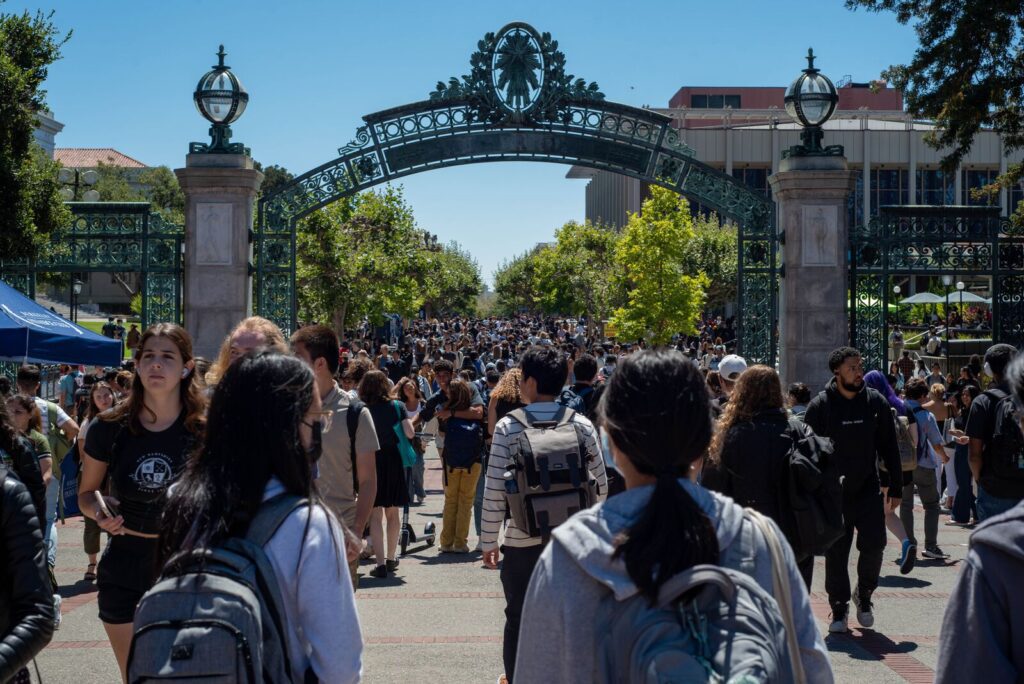
Update, April 28 All 23 current or recently graduated UC Berkeley students who earlier this month were told their legal statuses had been terminated have had their visas restored, according to the university.
“Our international office learned of this via their checks of the SEVIS record system,” UC Berkeley spokesperson Janet Gilmore wrote in an email on Monday. SEVIS is the Student and Exchange Visitor Information System, a U.S. government database that keeps track of international students on a visa.
An attorney for the U.S. government said Friday that ICE is working on a new policy for SEVIS record terminations.
ICE restores 12 UC Berkeley students’ visas while it works on formal termination policy
Original post, April 25 U.S. Immigration and Customs Enforcement (ICE), in a reversal, has restored the visas of about half of the 23 current or recently graduated UC Berkeley students who earlier this month were told their legal statuses had been terminated, according to the university.
The U.S. government database that keeps track of international students on a visa is known as the Student and Exchange Visitor Information System (SEVIS). Twelve UC Berkeley students whose records in the database were terminated have since been restored, Cal spokesperson Janet Gilmore wrote in an email on Friday. The restorations were first reported Thursday by the Daily Californian, UC Berkeley’s student newspaper. The email from Gilmore did not specify when students had their records restored.
Among the dozen students whose visas were restored Thursday is UC Berkeley Chinese international student Zhouer Chen, attorney John Sinodis said during a court hearing in Oakland Friday morning.
During the hearing, Elizabeth Kurlan, an attorney for the U.S. government, said ICE was in the process of restoring the student status for people whose records were recently terminated and is developing a new policy for SEVIS record terminations.
Across California, more than 100 students who had their visas abruptly terminated will have them restored, EdSource has reported.
Chen, who is less than a month away from graduating with a master’s degree in architecture, was one of four Chinese international students who sued the Trump administration for terminating her visa earlier this month. Last Friday, U.S. District Judge Susan Illston granted her a temporary restraining order preventing her from being arrested, incarcerated or moved outside the Northern California district for two weeks.
Chen’s complaint, filed in the U.S. District Court for the Northern District of California, has been merged with several similar cases. Another hearing is set for May 13, and the temporary restraining order has been extended for another two weeks by U.S. District Judge Jeffrey White, who is now presiding over the case.
ICE developing a formal policy for terminations
The federal government moved to terminate student records before a formal policy was in place for how to do so, according to the statement from the U.S. government attorney appearing in Oakland Friday and statements made by federal lawyers elsewhere.
A similar statement was read by a government attorney in a separate case in Washington, said lawyer Brian Green, who represents the plaintiff in that case. Green provided The Associated Press with a copy of the statement that the government lawyer emailed to him.
It states: “ICE is developing a policy that will provide a framework for SEVIS record terminations. Until such a policy is issued, the SEVIS records for plaintiff(s) in this case (and other similarly situated plaintiffs) will remain Active or shall be re-activated if not currently active and ICE will not modify the record solely based on the NCIC finding that resulted in the recent SEVIS record termination.”
NCIC is the National Crime Information Center, which is maintained by the FBI.
Tricia McLaughlin, an assistant Homeland Security secretary, said ICE had not reversed course on any visa revocations but did “restore SEVIS access for people who had not had their visa revoked.”
Greg Chen, with the American Immigration Lawyers Association, said some uncertainty remained: “It is still unclear whether ICE will restore status to everyone it has targeted and whether the State Department will help students whose visas were wrongly revoked.”
Legal fights may not be over
Green, who is involved in lawsuits on behalf of several dozen students, said his cases only sought restoration of the student status and that he would be withdrawing them as a result of the ICE statement Friday.
But lawyers in the Oakland case are seeking a nationwide court order prohibiting the government from arresting or incarcerating students, transferring them to places outside their district or preventing them from continuing work or studies.
Pam Johann, a government lawyer, said it was premature to consider anything like that given that ICE was in the process of reactivating student status records and developing a policy. “We should take a pause while ICE is implementing this change that plaintiffs are seeking right now, on its own,” she said.
But U.S. District Judge Jeffrey S. White asked her to humor the court and clarify ICE’s statement.
“It seems like with this administration there’s a new world order every single day,” he said. “It’s like whack-a-mole.”
Last month, Secretary of State Marco Rubio said his department was revoking visas held by visitors who were acting counter to national interests, including some who protested Israel’s war in Gaza and those who face criminal charges. But many students whose status was terminated said they did not fall under those categories.
At least 1,220 students at 187 colleges, universities and university systems have had their visas revoked or their legal status terminated since late March, according to an Associated Press review of university statements, correspondence with school officials and court records.

